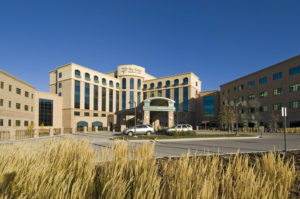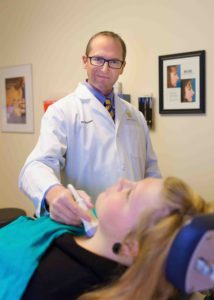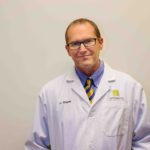Meet Sky Ridge Thyroid Specialist | by

Dr. Clark Walker | Ear, Nose, Throat and Neck Surgeon
“At Sky Ridge, we do everything we can to help our patients and their families navigate this challenging time. I derive great satisfaction from my patients who are cancer survivors. They are never the same — life means much more to them, and they are kinder, wiser and more giving people. They inspire me.”
According to the American Cancer Society, nearly 65,000 people were expected to be diagnosed with thyroid cancer in 2016.
And while that number may be low compared to breast or lung cancer, it is a significant increase from three decades ago, says Sky Ridge Medical Center’s Dr. Clark Walker, an ear, nose, throat and neck surgeon, who adds that “it’s not clear if this is a real increase in numbers, or we are just much better at diagnosing it.” Colorado is no exception and, in some areas of metro Denver, such as certain neighborhoods surrounding the former Rocky Flats nuclear weapons plant, rates might be even higher than the national average. Thyroid cancer, however, is one of the more treatable cancers if caught early, a challenge in itself since it is often not accompanied by any overt symptoms (see box). Colorado Health & Wellness sat down with Dr. Walker to find out more about this disease, who is at risk and how to get screened for it.
 Tell us a little about how Sky Ridge Medical Center approaches thyroid cancer care.
Tell us a little about how Sky Ridge Medical Center approaches thyroid cancer care.
I am very passionate about thyroid surgery patients. They come in scared and worried about this lump in their neck. Biopsies are performed in the office — they don’t have to go to another location for that service. I show them the ultrasound images and discuss what those mean. I am committed to patient education. Our patients appreciate the thoroughness of our interviews, and I strive to answer every concern before an individual leaves my practice — every patient interview ends with the question, ‘What questions do you have that I have not answered for you?’ I believe it is important that patients under our care always go away well informed.
If there are often no symptoms, how do health professionals diagnose thyroid cancer?
Sometimes patients have an imaging study for other problems and thyroid nodules are seen that the patient didn’t know about. This happens quite often. It is rare to have symptoms related to hormone levels so, almost always, blood hormone levels are normal, even when there are large nodules or cancers. Blood work alone is not an adequate screening. Frequently, thyroid nodules are found in a thorough wellness exam performed by our excellent primary care providers. It is much more common in women than men, and gynecological providers often include a neck exam on every annual screening. If not, you should request it. I also get referrals from a number of other caregivers — dentists, massage therapists and chiropractors have found masses in the neck.
What happens after a nodule is found?
The great majority of thyroid nodules are small and benign and can be watched, over time, to see if they continue to grow. If they grow to a certain size — 10 millimeters or larger— or have a worrisome appearance such as irregular contour, calcifications, increased blood flow, etc., we worry that it can be a cancer. At that point, we check blood levels and do an ultrasound. The ultrasound gives us a great amount of information and there is no radiation involved. We can tell if there are features of the gland and nearby lymph nodes that raise the risk of the nodule being cancer. If the nodule is large enough, we perform a fine needle biopsy in the office.
If the biopsy shows a papillary carcinoma (the most common type of thyroid cancer), we remove the entire gland, and most often, nearby lymph nodes, as that is the usual site if the tumor has spread. People do very well and the recovery is usually quite rapid. Often, surgery is curative and no further treatment may be necessary, but on-going surveillance is required.
 Who is at a higher risk for thyroid cancer?
Who is at a higher risk for thyroid cancer?
If you have a family member who had any type of thyroid problem, you are at higher risk of many types of thyroid problems, including cancer. You should mention this to your primary care provider and have a screening. I am also concerned about patients who had external beam radiation therapy many years in the past. In the 1950s, they used radiation for many types of minor problems such as large tonsils or even acne. The treatment worked well, but many years later patients developed cancers at the site of treatment. People who are providing x-rays on a daily basis such as dental technicians or veterinary techs are at higher risk unless they use adequate protection.
What should those at higher risk or exhibiting symptoms do?
If you are concerned about the possibility of thyroid cancer, or have a lump in the neck, or a family history of thyroid issues, don’t hesitate to talk about it with your primary care provider, or see an endocrinologist or surgeon, and remove the worry.
SIGNS & SYMPTOMS:
“Most often, there are no symptoms,” Dr. Walker says — “you or your doctor can find a lump or growth in the gland.” But if a tumor grows large enough, it can cause some noticeable signs. These include:
- Swelling in the neck
- Pain in the front of the neck, sometimes radiating to the ears
- Persistent hoarseness or other voice changes
- Trouble swallowing or breathing
- A constant cough that is not due to a cold
FAST FACTS
- Thyroid cancer occurs about three times more often in women than in men
- Most women are diagnosed in their 40s and 50s. Most men in their 60s and 70s
- Most thyroid cancer cases occur between the ages of 20 and 55 years
If you have any questions about your risk factors, call the Sky Ridge Cancer Care Line at 720-225-2273.
Tags: Sky Ridge Medical Center
Leave a Comment
Please be respectful while leaving comments. All comments are subject to removal by the moderator.

